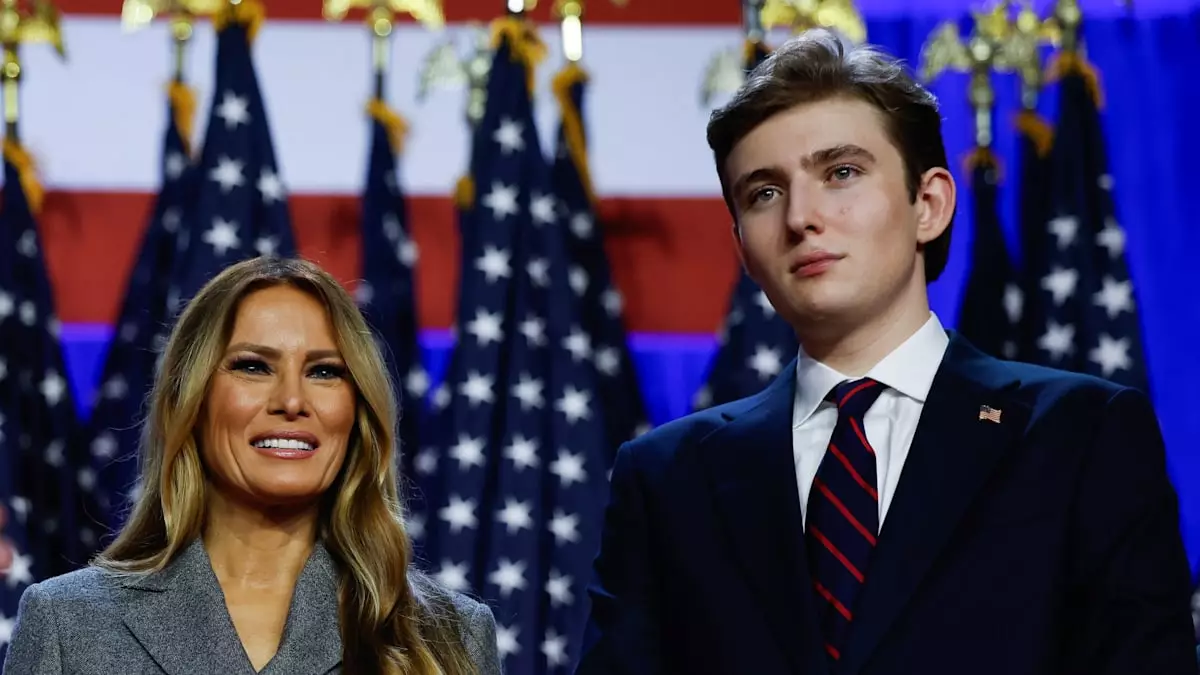In a world dominated by information overload and sensationalism, the line between fact and fiction often blurs for the average consumer of news. Recently, an internet rumor swirled around First Lady Melania Trump, suggesting that her husband, Former President Donald Trump, launched into a public attack against Harvard University due to a personal grievance involving their son, Barron. The claim generated a significant uproar, stirring both the political and educational landscapes. However, what could easily be dismissed as another baseless rumor has incited serious conversations about privilege, media manipulation, and the role of family in political discourse.
The rumor gained traction particularly after Senator Sheldon Whitehouse from Rhode Island tweeted a speculative remark hinting at the possibility of the Trumps being rejected by prestigious academic institutions, tying it awkwardly with President Trump’s growing hostility toward Harvard. This claim was effectively debunked by the First Lady, who clarified through her communication director that Barron had never applied to Harvard. Nonetheless, the incident raises questions about the motivations behind such fallacies and the pervasive culture of speculation which dominates our current media ecosystem.
The Pressure on Academia
Donald Trump’s aggressive stance against Harvard University encapsulates a broader narrative surrounding the role of higher education in America. His administration has made efforts to cut federal funding, limit the enrollment of foreign students, and eliminate diversity programs championed by the university. The idea here seems to be a fervent attempt to reshape academic institutions viewed as bastions of liberal thought, which many in Trump’s camp believe undermine traditional conservative values.
It is essential to note that Harvard’s response has reflected resilience, filing legal actions against Trump’s measures, indicating their unwillingness to bow to political pressure. The war of words between Trump and the university highlights a clash of ideologies, where academic integrity is contested amid populist sentiments. It evokes a sense of urgency for educational institutions to defend principles of diversity and inclusion, particularly in an age where these values are often ridiculed for political gain.
The Reality of Barron Trump’s Decision
In the midst of this politically charged environment, Barron’s choice of New York University’s Stern Business School—that comes as a surprise to some—forces the narrative to refocus on individual agency amidst the high-stakes family backdrop. Melania’s disclosure regarding Barron’s enrollment experience sheds light on a critical, yet under-discussed aspect: the transition from childhood to adulthood in the public eye. It is evident that Barron navigates a unique landscape that few, if any, can relate to in the same depth. It challenges our expectations of “normalcy” for a young man stepping into the world of higher education.
As the youngest son of a former president, Barron’s college experience necessarily differs from that of his peers. “I don’t think it’s possible for him to be a normal student,” Melania asserted in interviews, posing significant implications for how we consider the intersection of family dynamics and public life. Barron’s experiences are emblematic of a generation that is coming into their own politically and culturally, particularly in a landscape where youth activism is gaining momentum.
Generational Insight: Barron as a Bridge to Gen Z
Turning attention to Melania’s praise for Barron’s insights into politics and his understanding of Gen Z voters, we see a burgeoning realization of his potential to bridge generational divides. In an age where digital media consumes daily life and young voices clamour to be heard, Barron stands at a unique crossroads. His experiences, coupled with Melania’s belief in his capacity to engage younger audiences, point toward an emerging reality: political dialogues are evolving, and now more than ever, young voices are instrumental in shaping these discussions.
“It’s a very high-quality place. He liked it. He liked the school,” Donald Trump expressed, emphasizing Barron’s agency in selecting his institution. This not only reinforces the importance of choice in education but also highlights the nuanced understanding that different paths to knowledge can yield valuable insights. In a time when political relationships and public perception dominate headlines, Barron’s journey reveals the intricate connection between personal experiences and larger societal movements, adding a significant layer to the ongoing conversation about youth in politics.
Educators, parents, and community leaders should take heed of Barron’s experience as part of a broader dialogue on inclusivity and understanding generational needs in education and beyond. As we dissect the narratives that frequently emerge from the political stage, we must remain vigilant in distinguishing between sensational rumors and substantive truths. In the end, the story of Barron Trump may well illustrate the evolving landscape of not just a political family but of an entire generation poised for significant change.
